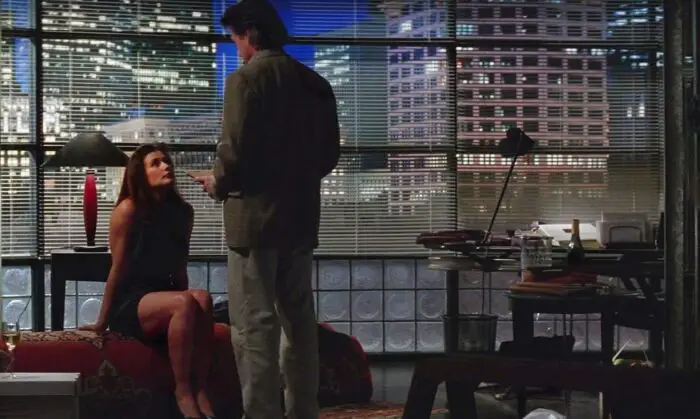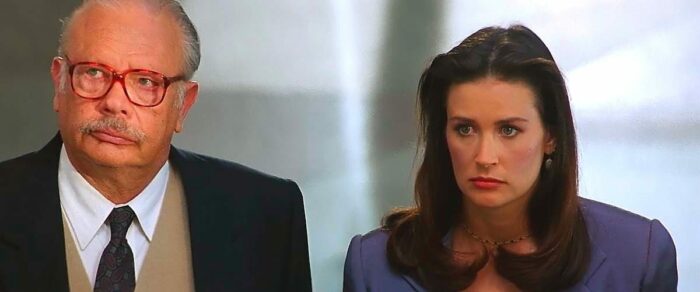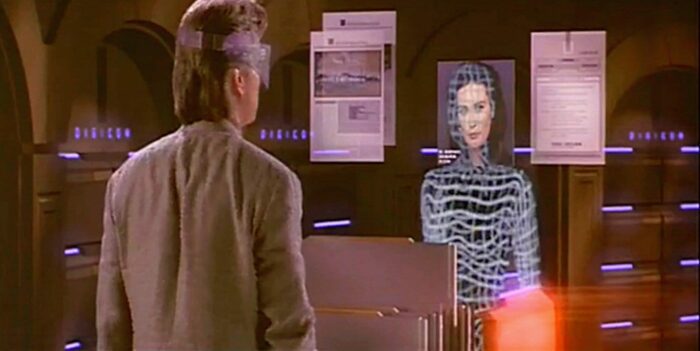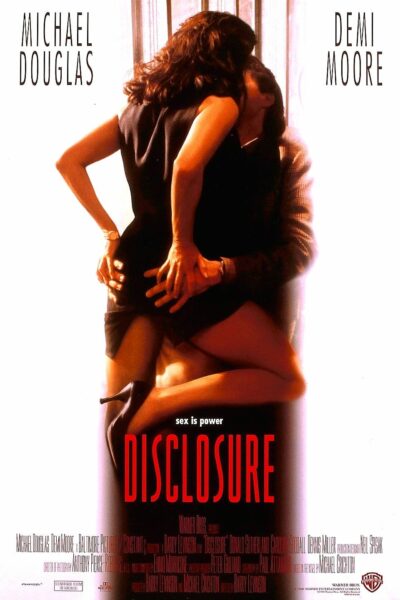It’s hard to imagine today, but there was a period in cinema when the holiday movie season wasn’t all just about epic laser battles in distant galaxies or origin stories of buffed-up super-babes and of course, super-dudes. There was a period where movies about actual adults in adult conflicts and situations were a common sight inside your local mall multiplex.
One of those periods was during the holiday season of 1994. December of 1994 was an interesting moment in movie history as cinemaniac’s everywhere were just beginning to come down from the movie-junkie high they experienced from Pulp Fiction two months earlier (Guilty. I was one of those junkies).
What Hollywood offered audiences that late fall was an eclectic mix for sure: Interview with the Vampire, Love Affair, Mary Shelley’s Frankenstein, a pregnant Arnold Schwarzenegger (ugh) in Junior and the outrageous Dumb and Dumber.
It also offered a very adult, intelligent, well-crafted, workplace sexual thriller that would be absolutely buried in today’s marketplace but in 1994, a movie like this was not only common to see, they actually made money.
Disclosure, directed by Barry Levinson (picking himself right up after the disaster that was 1992’s Toys, not to mention ’94’s forgettable Jimmy Hollywood), is a thoroughly engaging, compelling movie written by Paul Attanasio adapted from the hot-button novel by Michael Crichton. After the success of Jurassic Park in 1993, studios were buying up every Crichton property they could. Disclosure was one of the first and everybody must have breathed sighs of relief when it actually turned out to be quite good.
In Disclosure, Tom Sanders (Michael Douglas) is project manager of development at Digicom, a leading Microsoft-ish software and hardware developer. Sanders’ boss, Bob Garvin (a great as always Donald Sutherland who provides the movie’s most humorous and cringiest moment) is unhappy with some lagging developers are facing in having to re-tool and re-design faulty equipment which is not ready for the very in-demand and ever-changing computer hardware marketplace. A spot for a new head of overall development opens and Sanders feels he is the best candidate for the position.
This is not to be the case as Bob announces that Meredith Johnson (a ferociously terrific Demi Moore), a former lover of Tom’s, is given the job. Tom decides to go-along-to-get-along for the good of the company. That means accepting Meredith’s invitation to a late-night business meeting in her very modern, very empty, very dark, office where the two can be very alone. It isn’t long before discussion regarding work turns personal.

Tom, who is now married to an attorney named Susan, talks family with Meredith who has never married. During a business call, Meredith begins to force herself unto Tom who is caught by surprise. Despite his verbal indications that this is wrong, the two get very sexually physical. With Meredith in control, Tom, is overcome with the need to regain his power and then he’s taking control by ripping open Meredith’s top and pushing her hard against the table. The two former lovers engage in oral sex with each other before Tom realizes this is very wrong. He storms out of her office, where she makes some very serious threats against him.
This is a very graphic, very adult, very explicit sex scene (in a mainstream holiday Hollywood release no less) however, it is not sexy at all. It’s slightly emotionally violent and its two participants seem to be engaging in anything other than passion – these two individuals are battling it out for dominance over one another. This isn’t sex. Its combative politics with both using sex as the main weapon. Neither participant succeeds in the end.

The next morning, Tom learns from Phil, Digicom’s attorney (an also great Dylan Baker), that Meredith has charged him with sexual harassment. Tom decides to charge her back. This in-fighting within the company becomes a liability for everybody so plans are made to oust Tom. Except Tom has an ace up his sleeve: in the form of an answering machine micro-cassette that has captured his entire encounter with Meredith.
In 1994, a movie like Disclosure raised questions about what constituted sexual harassment in the workplace and now 25 years later, are we any clearer on answering them? On a societal level, hopefully we are, and recent movements have shown that yes, we are all clear on what is and what isn’t considered sexual harassment in the workplace—or sexual harassment in general.
This look back on Disclosure is to be published at exactly the same time when a mini-series about sexual harassment within an extremely popular, extremely powerful news organization in the United States was rampant with accusations of sexual harassment by its founder/owner. That series, The Loudest Voice In the Room (Showtime) spotlights events which allegedly occurred in 1996, not that long after Disclosure was released.
I suppose at the time, Disclosure could be thought of as perhaps nothing more than an evening’s entertainment. It was a major budget, major holiday studio release starring two of the industry’s biggest stars, directed by a major Oscar-winning director (in early discussions, Steven Spielberg was interested in even making this film). But now, it would be so much more. I wonder who would approach this material today? Or how it would be approached? Would Tom be portrayed as sympathetic a character as he is in this film? How would Meredith be portrayed? If Disclosure was made today, who would star in it? (No doubt that Jessica Chastain would absolutely slay in this role).

A word about Moore’s Meredith Johnson: this was a bold move for Moore to play this character, especially after earning her place as one of the industry’s biggest movie stars after Julia Roberts and Meg Ryan. After her roles in Ghost, A Few Good Men, and Indecent Proposal, Moore was box-office gold. She’s great in her role here—even if it is slightly under-developed. Meredith is all business and not less than three minutes into her meeting with Tom, she is all over him. For the rest of the movie, her only trait is vindictiveness. There are no other shades to her and that’s a shame because Moore was very capable of exhibiting much well, more in regards to who Meredith was.
It’s funny that these characters work in the computer/tech/design/software industry because if the internet was what it is now back in 1994, neither character would have even been welcomed into work the morning after their encounter. It’s also rather amusing to realize that one of the major concerns the characters in this movie have is that a chip implanted in their manufactured CD-ROM drives is faulty and could take up to a year(!) to repair. However, email and voice messaging services become Tom’s saving graces (much like today for most people).
As an entertainment, Disclosure is very well made. It’s slick, polished, wonderfully paced, engaging, smart and just plain works not to mention, it features a killer Ennio Morricone score from when the legendary Italian composer was working steadily in Hollywood. One big flaw with this movie is that very weird seven-minute sequence where Sanders enters a virtual-reality world containing Digicom’s archives and files while he’s being pursued by a virtual entity featuring Meredith’s face on its head (with Moore’s short Indecent Proposal haircut). This sequence is as laughable now as it was then, even though it does showcase some great early virtual reality work by Industrial Light and Magic (ILM)—work later utilized to great effect in the Star Wars prequels.

Despite having many things going against it, most notably being an adult drama released at Christmastime, Disclosure did find its audience and was a box-office success. There was some controversy of course. The original poster designed by Warner Bros. featuring Moore straddling Douglas had to be changed late into that season’s schedule as theater owners refused to display it. They wound up coming up with a poster showcasing Moore whispering into Douglas’s ear. Perhaps there was fear that people felt this would be Basic Instinct 2 with the original poster.

25 years later, our technology has greatly improved since Digicom’s wonky CD-ROM’s, more women are in positions of power in giant tech (and other) industries, Demi Moore still looks the same (in other words, tremendous) and a great irony which has transpired is that Hollywood had its own reckoning in regards to sexual harassment. Was Disclosure ahead of its time?
1994 saw another movie regarding sexual harassment released, David Mamet’s Oleanna. That movie was much smaller but more emotionally taxing and raised many questions mainly who’s likely to be believed in those situations? Both movies are about a person in power (in Oleanna, it’s a college professor played by William H. Macy) who prey on an underling. However, it’s the opposite sex who winds up defeated in the end. In Oleanna, Macy’s character is the one who’s ruined, quite possibly for good. In Disclosure, Meredith may have lost her job at Digicom, but as she points out, she’ll likely be back in ten years where she’ll be in a position to own the corporation.
Perhaps she did. Perhaps she didn’t. In her final moments, Meredith doesn’t express regret for what she did. She expresses regret that she didn’t get away with it and worse in her mind, she got outsmarted.
With all the women in society leading giant tech companies in the year 2019, the lasting hope there is that hopefully, there isn’t anyone like Meredith Johnson anyplace among them.


